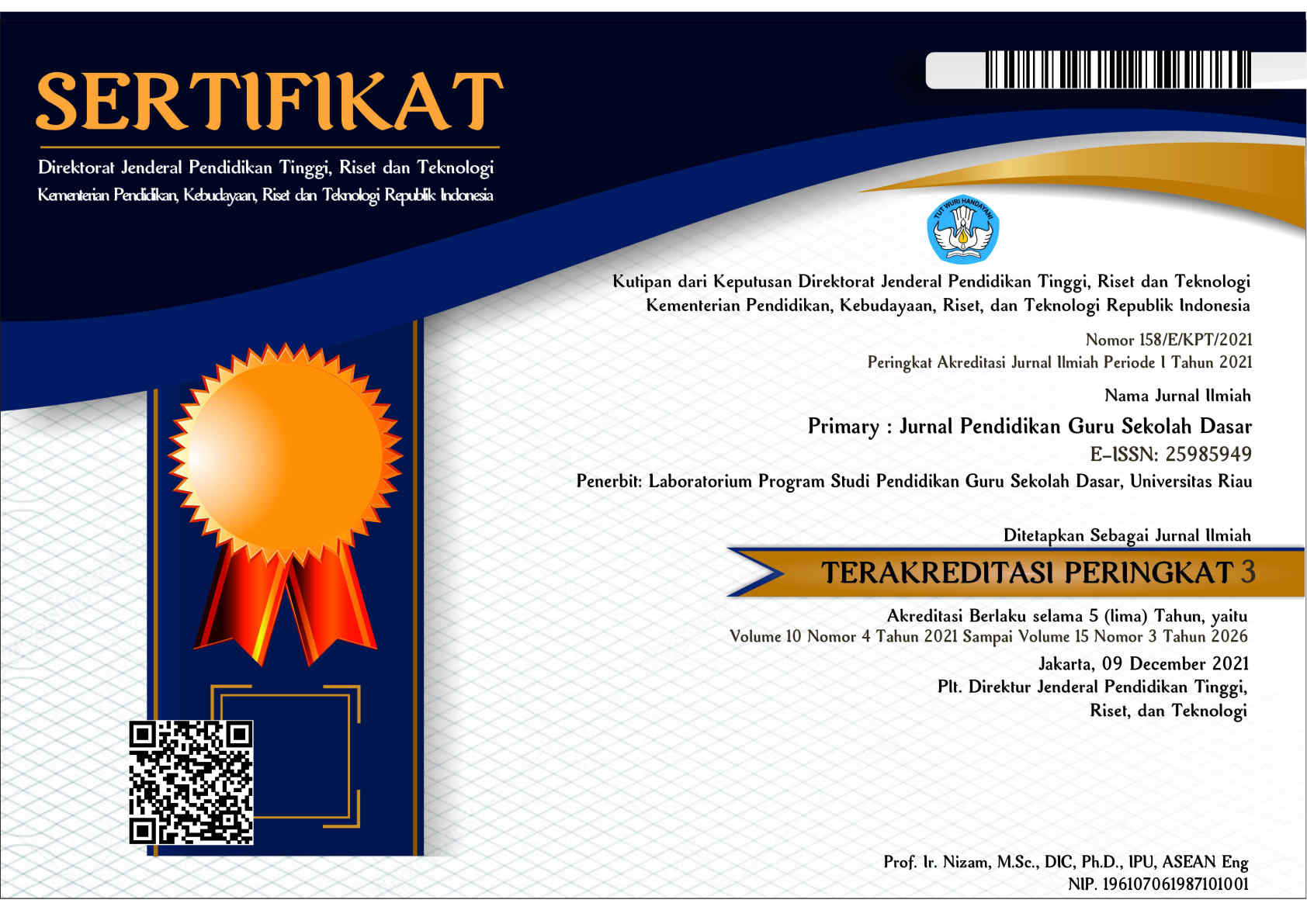ETIKA LINGKUNGAN SISWA SEKOLAH DASAR DI PEKANBARU
Abstract
Humans have an important role in protecting nature or the environment, to preserve the environment the need for environmental ethics. The Adiwiyata program can instill environmental ethics in school residents, especially students. Research conducted to describe environmental ethics on the behavior of elementary school students around the canteen. Environmental Ethics Indicators visible around the canteen are: 1) Responsibility for the Environment, 2) Solidarity with the Environment, 3) Compassion and care for nature or the environment, 4) Do not damage the nature or the environment, 5) Live simply and aligned with nature. This type of research is descriptive research, the research instrument is observation and interviews. The results is environmental ethics did not yet exist on student behavior. This type of research is descriptive research, the research instrument is observation and interviews. The results showed that environmental ethics did not yet exist on student behavior. Student awareness in protecting the environment is still low, seen from the lack of environmental ethics in student behavior. The school should pay more attention to environmental ethics on student behavior, and make activities that can instill or enhance environmental ethics on student behavior
Keywords
Full Text:
PDF (Bahasa Indonesia)References
Ariwidodo, E. (2014). Relevansi Pengetahuan Masyarakat Tentang Lingkungan dan Etika Lingkungan dengan Partisipasinya dalam Pelestarian Lingkungan. Nuansa, 11(1), 1–20.
Barkatin, S. L., & Wijiyanto, H. (2016). Kasus Pendidikan Menengah di Kabupaten Bogor. Student Behavior Analysis of Environmental Case Study in Secondary Education Bogor Regency, 6(2), 122–130.
Febrita, E. (2017). Pendidikan Lingkungan. Pekanbaru: CV Draft Media.
Florit, L. F., & Grava, D.D.S. (2017). Environmental Ethics and Sustainable Territorial Development. an Analysis From the Speciesism Category. Ambiente & Sociedade, 19(4), 39–58.
Frey, B. S. (1992). Pricing and regulating affect environmental ethics. Environmental & Resource Economics, 2(4), 399–414.
Handayani, T., Wuryadi, & Zamroni. (2015). Pembudayaan Nilai Kebangsaan pada Pendidikan Lingkungan Hidup Sekolah Dasar Adiwiyata Mandiri. Jurnal Pemangunan Pendidikan, 3(1), 95–105.
Jennings, V., Yun, J., & Larson, L. (2016). Finding Common Ground: Environmental Ethics, Social Justice, and a Sustainable Path for Nature-Based Health Promotion. Healthcare, 4(3), 61.
Keraf, A. S. (2010). Etika Lingkungan Hidup (1st ed.). Jakarta: Kompas.
Prasetyo, K., & Hariyanto. (2017). Pendidikan Lingkungan Indonesia Dasar Pedagogi dan Metodologi. (P. Latipah, Ed.) (1st ed.). Bandung: PT Remaja Rosdakarya.
Riduwan. (2012). Metode & Teknik Menyusun Proposal Penelitian. Bandung: Alfabeta.
Suliantoro, B. W. (2011). Rekonstruksi Pemikiran Etika Lingkungan Ekofeminisme Sebagai Fondasi Pengelolaan Hutan Lestari. Jurnal Bumi Lestari, 11(1), 111–119.
Tim Adiwiyata. (2012). Panduan Adiwiyata Sekolah Peduli dan Berbudaya Lingkungan. Jakarta: Kementerian Lingkungan Hidup.
DOI: http://dx.doi.org/10.33578/jpfkip.v8i2.7356
Refbacks
- There are currently no refbacks.
Copyright (c) 2019 Nur Salwa, Eddy Noviana

This work is licensed under a Creative Commons Attribution-NonCommercial-ShareAlike 4.0 International License.
____________________________________________________________
Primary: Jurnal Pendidikan Guru Sekolah Dasar
Secretariat
Program Studi Pendidikan Guru Sekolah Dasar
Gedung B1, FKIP Universitas Riau
Kampus Bina Widya Km. 12,5 Simpang Baru Panam
Pekanbaru Riau Indonesia 28293
e-mail : primary@ejournal.unri.ac.id



